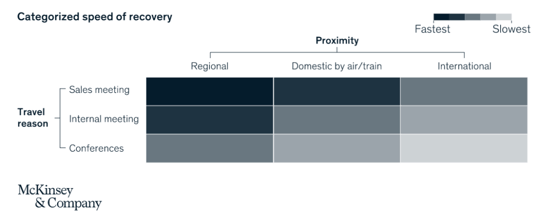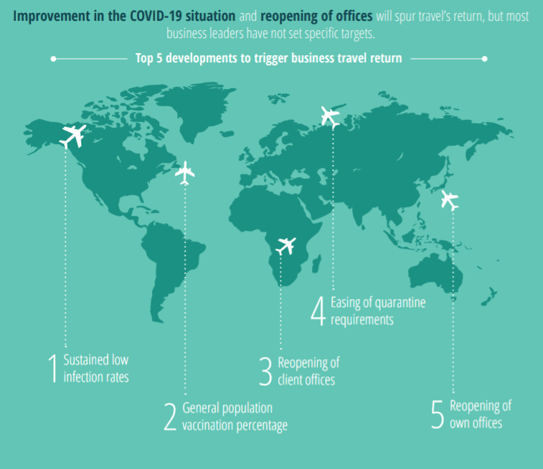Corporate travel, like so many other things engrained into our societies, all but vanished into thin air once the pandemic began to spread its wings. To be specific, corporate travel spending in Europe fell 58% during 2020.
While some are pondering over whether business trips were really ever about ‘business’ at all – (Pilita Clark of The Irish Times, referencing a recent business travel survey, writes: ‘When asked to name the personal reasons for wanting to get back in a business lounge, 52% said they wanted to “experience new places”, 41% admitted they were keen on “taking a break from their everyday life” and 19% said they were simply looking forward to being able to dress up and go somewhere’) – it’s clearly evident that whatever the reasons, corporate travel will be back (well, technically it’s already back). It’ll just look very different to how it did in 2019.
While a portion of meetings and business deals were of course done online and over the phone in our pre-Covid world, as well as some companies who functioned fully remotely before any hint of a pandemic, there was already a vague sense of awareness around the capabilities of technology when it came to communication – if administered by smart and creative employers.
However, no one could have ever predicted that the 9-5 world would be shoved into the ‘great remote experiment’ as quickly as it was. And, yes – the collective agreement was that it worked quite well. Surprisingly well. Companies realised the costs saved on travel during this time period of online meetings.
However, after all our exclaims of surprise and enthusiasm, a great few of us in the corporate workforce started to experience what’s well known now as ‘Zoom fatigue’.
For all its potential efficiencies, a Zoom call just isn’t the same as an in-person meeting.

As well as a lack of body language and proficient eye contact, it can feel at times a little awkward and tiresome. Cyberpsychologist Linda Kaye, a senior lecturer at Edge Hill University, says: ‘You’re trying to pay more attention to those social cues that actually can become very effortful.’
It’s most likely that many workplaces that have the ability to do so will move to hybrid models of working – meaning their employees will work between the office and home.
Back to the return of business travel…
Corporate travel is beginning to rebound.
While Bill Gates has suggested 50% of corporate travel is gone forever, it’s not all bad news. Following over a year of online meetings, the first corporate travellers are back on the road, and demand is on the up. Due to the quick and widespread vaccination programme in the United States, the corporate travel recovery has been most evident there. In Europe, corporate bookings for domestic flights and hotels in countries like France are sky rocketing, with hotel bookings at 80% of 2019 levels. In London, corporate travel accounts for a fifth of all visits, and in Milan, it accounts for a quarter.
While it won’t be a speedy recovery across the board, we are at least seeing progress.

Deloitte are confident that the final quarter of 2021 will see an uplift in corporate travel, accelerating by the time we hit 2022. Many conferences and industry events will return in live and hybrid formats, requiring some corporate travel for those who can do so (Deloitte’s survey respondents rated missing out on conferences and trade shows during the pandemic as very impactful to their business, particularly in relation to networking).
It seems Deloitte have noted that business leaders are recognising the importance of face to face interaction following months of speaking to the world through a computer screen – however, client meetings will be prioritised, and technology will still be used to conduct certain internal meetings that may have been thought to require travel before the pandemic.

The key change in corporate travel is that it will be done more mindfully.
As travel returns, companies are eyeing both their carbon footprint and their bottom line.
Whether it’s about the environmental impact (more than 400 companies
signed a pledge at 2021’s Davos World Economic Forum to decarbonize by 2050) or the fact that online interaction may be suitable in some cases, there will be more consideration put into corporate travel in the future, and it’s unlikely we will see it return to 2019 levels anytime soon.
In the meantime…
Remember all the flexible workers closer to home and start considering a ‘workation’ or ‘bleisure’ package if you haven’t already done so.
Whether you have a domestic guest staying to meet a client/colleague or they’ve just decided to take a mini-break and work on either side of it, you can encourage them to stay longer by offering them a special ‘workation’ short-stay package. Find out more here!
Interested in learning more? Send us an email on hello@netaffinity.com




